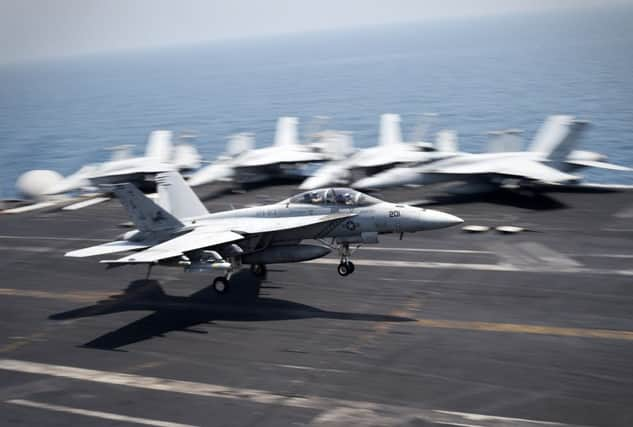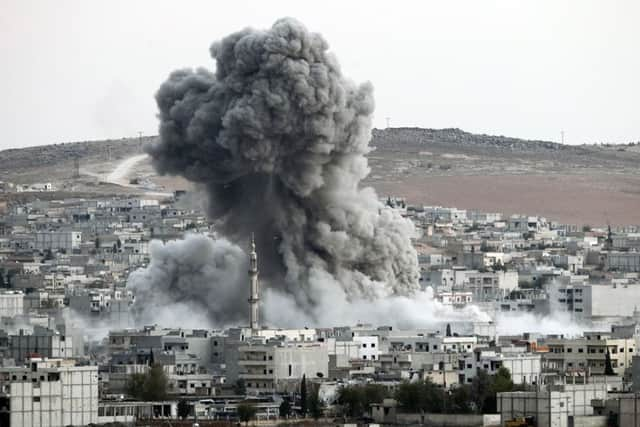RAF strikes in Syria ‘flout democratic will’


The row has led the SNP to demand that Defence Secretary Michael Fallon comes to the Commons on Monday to explain the government’s decision “to bomb Syria by stealth”.
Former SNP first minister Alex Salmond has tabled an urgent question after a freedom of information request revealed that the UK had expanded its operations against Isis from Iraq into Syria despite a vote by MPs in August 2013 expressly forbidding military action there.
Advertisement
Hide AdAdvertisement
Hide AdIt follows a recent statement by Mr Fallon in which he said MPs would need to reconsider the position on tackling Isis, but promised to bring any decision to stage military operations in Syria to the House for a vote before taking action.


The government had claimed that airstrikes and other military actions were confined to tackling Isis solely in Iraq while other allies including the US dealt with them in Syria.
But details of the involvement of UK aircrew were disclosed by the MoD in response to a freedom of information request from the pressure group Reprieve.
It said UK military personnel were embedded with units of the US, Canadian and French armed forces taking part in international coalition operations against Isis in Iraq and Syria.
“UK embeds operate as if they were the host nation’s personnel, under that nation’s chain of command,” the MoD said in its response.
“These personnel include pilots flying ISR (intelligence, surveillance, reconnaissance) and strike missions against Isil targets using the equipment of those units. Of these three nations, only the USA and Canada are operating in Syrian airspace.”
It is understood that 20 UK military personnel are embedded with other forces including three RAF pilots.
RAF planes are also already involved in surveillance flights and air-to-air refuelling operations over Syria in support of coalition strike missions.
Advertisement
Hide AdAdvertisement
Hide AdFollowing last month’s terror attack on British tourists in Tunisia, Prime Minister David Cameron and Mr Fallon indicated they could seek Commons approval for UK warplanes to join the airstrikes.
Mr Fallon claimed it was “absolutely standard practice” to exchange personnel with allies and had been “since the end of World War Two”.
He added there was “no mystery about that”, and “most people have known”.
Last night Downing Street insisted that the UK personnel involved were embedded with Nato allies and in effect were acting as foreign troops, not under British command.
The PM’s spokeswoman said the policy of embedding UK personnel with foreign forces had been in place since the 1950s and was “well known”. The Ministry of Defence had been asked about the issue before, she insisted.
She said “upward of a dozen” Britons were embedded with other nations engaged in the counter-IS campaign, although currently none of them are pilots.
But the move was condemned by the SNP who pointed out that Mr Fallon had promised another vote by MPs before allowing UK airstrikes or other military action in Syria.
Mr Salmond, now the party’s foreign affairs spokesman in the Commons, said: “This action clearly flouts the democratic decision taken by the House of Commons two years ago for the UK not to take part in a bombing campaign in Syria.
Advertisement
Hide AdAdvertisement
Hide Ad“And just as inexcusable, the Defence Secretary Michael Fallon led a Commons debate on Syria only this month – before which he briefed about the likelihood of the UK bombing in Syria in the future – yet he didn’t say a word about UK military personnel already sent into action.”
He added: “The case for bombing in Syria has simply not been made, and the complexity of the situation is such that support for one faction is unlikely to produce a desirable outcome.
“Experience tells us that interventions can have unforeseen consequences. Past interventions and extensions of military action could at best be described as counter-productive, and at worst have helped to replenish the dark well from which terrorism springs.”
SNP defence spokesperson Brendan O’Hara MP said: “We need answers to all the questions Mr Fallon has been hiding from, such as how long this action was planned and what the UK government’s future intentions are. Above all, we need to arrive at a situation where there is no UK involvement in military strikes without the express approval of Parliament – and the SNP certainly believe that there is no case for bombing at this time.”
There was anger on the Tory backbenches about the decision to apparently ignore Parliament.
Tory backbencher John Baron, who opposed airstrikes in Iraq, said that ministers must come to the Commons to explain what had happened.
“We had a major vote. There should be sensitivity on this issue and we should be very sensitive to the fact that we have military personnel participating, in effect, in military intervention,” he told the BBC Radio 4 Today programme.
“Those individuals should be withdrawn from the embedded programme.”